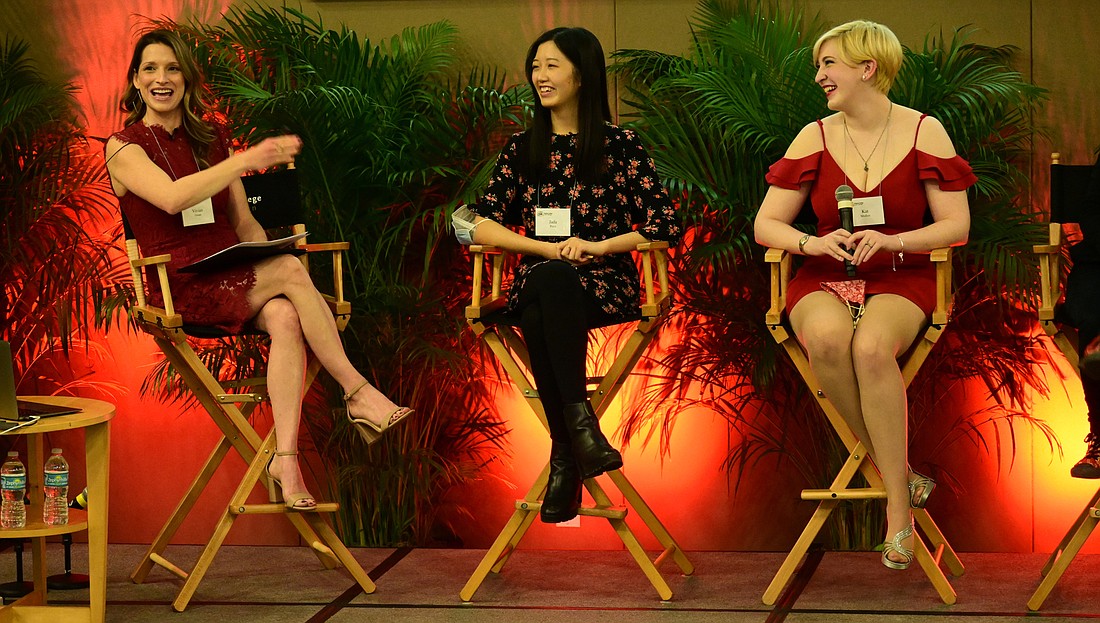- November 22, 2024
-
-
Loading

Loading

Jada Wing Hang Poon was stifled, unsure of where she could take her creativity.
And then she started flowing.
Poon, a graduate of Ringling College of Art and Design, celebrated the premiere of her short film “Code Red” on Tuesday evening, and she spoke about her moment of inspiration.
“It really started out of spite,” Poon said prior to the screening. “I was having my period while having writer’s block for my class on screenwriting. I really hated having my period, and I didn’t know what to write. I’m just going to write about it. Because why not?
"I’m going to make my classmates uncomfortable hopefully because I was the only girl in class including my teacher. I wanted people to feel how I felt at the time, and that’s how I started 'Code Red.'”
The film, which endured a challenging production schedule due to the COVID-19 pandemic, represented a triumph for both Poon and her cast and crew.
"Code Red" tells the story of a young woman on a hero’s journey to obtain tampons or pads during the middle of a school day. And because of the pandemic interrupting Poon’s senior year, the film didn’t get made until after she had graduated and moved far away.
“Here we were trying to make a film about girls who miss out on opportunities in life because they get their period, and then we have a female writer-director and a female producer missing out on their opportunity to make their film due to COVID,” says Executive Producer Vivian Owen, a former member of the faculty at Ringling College.
Owen, who had also departed Ringling for a new job during the pandemic, found herself wrangling a student film that had turned into a post-graduate production. The film already had been casted and crewed, and the locations for filming had been selected.
All the paperwork was in and the filming was scheduled. And then it was all scrubbed. But Owen and the creative team decided they needed to find another way to make the film.
“The team and I knew in our hearts that this story must be made,” Owen says. “Periods don’t stop for pandemics. We keep having them every single month.”
Poon, for her part, says she cried when she learned that the production had to be postponed. And her producer, Katerina Mullen, allowed that the news was “devastating.” But then they began looking for funding and a new way to get the story done. And they enlisted the help of producer Zifeng Zhou, who was still on the scene and could troubleshoot in Sarasota.
Owen says that the final crew wound up being 60% female, and Zhou says the people who worked on the film represented alumni and students from five different classes.
“These guys had the ability to really choose who they wanted to represent them as their crew members,” Zhou says. “Not only was I a graduate of the school, but I had so many connections with the undergrads. I already knew who did well in what position. It was pretty easy for me to pick out the best person for whatever role they needed to fill.”
Poon says she has been most influenced by filmmakers like Taiki Waititi and Wes Anderson. Her film — which stars young students Jaida Leigh Miller, Madison Paige Baranoski and Maxwell Haman — follows the protagonist, Karman, and her best friend, Tiffany, as they attempt to navigate both nature and the complicated classrooms and hallways of middle school.
Karman is jumping rope as the film opens, but she realizes that her period has come and she needs to find a way to stanch the flow. The film follows her through her school day as she tries to deal with her personal crisis without alerting her many classmates.
The film employs many cut scenes — including one where a hand squeezes a tomato — to illustrate both what’s going on and to add some levity and humor.
“I think a lot of people can relate to Karman as we all talked as cast and crew,” Owen says about the protagonist. “I feel like everybody’s had a Karman moment where your period has hit and you find yourself without the products you need. You have to make that decision. ‘What do I do? Do I go home? Do I stay? Do I leave? What happens now?’”
Poon hopes that by making a film like "Code Red," the stigma about the menstrual cycle will begin to dissipate. It isn’t weird or gross or a topic to be avoided. It’s a natural part of life, and it’s only natural that it’s a subject of a coming-of-age drama for women.
And the time element only seemed to sharpen the message. The story was so vital that a mere delay couldn't derail it from coming into existence, and the cast and crew relished the opportunity to return to the material they had developed.
"For me, coming and producing the film two years later, there was just this overwhelming joy and excitement for all of us," Owen says. "It had been a year and a half in isolation. You're not talking to anybody. You're doing everything over Zoom. And then to be in a room with all these creative people and bouncing ideas off each other, … it was just really energizing."
Zhou, for her part, says being part of a project helmed by women was really rewarding.
“I don’t know how many people really realize this, but 50% of the world is made up of females, which also means that 50% of the stories we tell come from females,” Zhou says. “We don’t want to lock away all these hidden stories that can be told. … A story like this, for example, can accurately represent a female perspective through the eyes of a woman.
"A man trying to tell the story of a little girl on her period, probably not possible.”